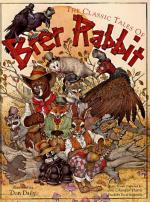|
This section contains 5,381 words (approx. 18 pages at 300 words per page) |

|
SOURCE: "Uncle Remus and the Folklorists," in The Southern Literary Journal, Vol. VII, No. 2, Spring, 1975, pp. 88-104.
Below, Light examines Harris's perception of the ethnological significance of his Uncle Remus stories.
No one was more surprised than Joel Chandler Harris himself to learn that the Negro animal fables he had written for the Atlanta Constitution had a "scientific" as well as a literary value. Yet within six months of the first weekly installment of the stories in the Constitution on November 16, 1879, John Wesley Powell of the Smithsonian Institution Bureau of Ethnology had written him concerning their ethnological importance. Powell's was but the first of a flood of such communications. As Harris later recalled, the collection of the stories under the title Uncle Remus: His Songs and His Sayings, published in December, 1880, "brought letters from learned philologists and folklore students from England to India. . . . from royal institutes and literary...
|
This section contains 5,381 words (approx. 18 pages at 300 words per page) |

|


